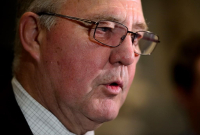Support strong Canadian climate journalism for 2025
A former chairman of the federal advisory panel on firearms says he found the committee to be a well-meaning but ultimately pointless exercise because members were not allowed to conduct independent research.
Jack Major, a retired Supreme Court judge, said Tuesday he wrote twice to Public Safety Minister Ralph Goodale about the need to hear witnesses and gather facts on gun-related issues, but got no reply to either letter.
In an interview, Major said Goodale had "good intentions" when he set up the committee, intended to counsel the public-safety minister on Canada's gun policies, laws and regulations. "But he or his staff didn't really think through what the committee was supposed to do."
Major's comments came a day after vice-chair Nathalie Provost resigned from the committee in frustration over lack of federal action to restrict assault-style rifles.
Major said he made his expectations clear at the first meeting in March 2017.
"If the committee's going to be of any value, we have to get evidence. We need to hear from witnesses. We need to hear from experts. We should have some idea what other countries are doing if we can make any sensible recommendation," Major recalled Tuesday.
"And one of (the minister's) staff said, 'Oh, we can't do that. It would just involve too many people.' "
"I said, 'Well, I don't see much point in you telling us what you've been doing. What are we supposed to do about it? We can't say what you've done is reasonable or unreasonable unless we know what the evidence is that led to that conclusion.'
"To simply be told what the government had done without any input from us, I felt, well, we're just being used. You know, there's a committee that's not doing anything, but it looks pretty good on paper."
In her resignation letter, Provost said the government repeatedly ignored calls for an overhaul of the firearms-classification system — a move that could put tighter controls on some semi-automatic rifles.
She also claimed the committee contributed nothing to the Liberal firearms bill, C-71, recently passed by Parliament — legislation she called extremely timid.
The bill expanded the scope of background checks on those who want to acquire guns, strengthened record-keeping requirements for sales and required purchasers to present valid firearms licences.
The committee examined all elements of the bill before its drafting and provided valuable insights to the government, said Scott Bardsley, a spokesman for Goodale. For instance, the government agreed with the committee's recommendation to allow restricted and prohibited firearms to be transported to a shooting range without requiring a written authorization.
The committee is meant to provide the minister with independent advice using its members' own expertise, he said. Members receive support from Public Safety and its agencies, and have access to the minister and his staff.
"We are grateful to Mr. Major for his service on the committee," Bardsley said, adding Goodale acknowledged Major's concerns and thanked him for raising them in a letter in 2018.
Internal notes for the committee's November 2018 meeting, released through access-to-information legislation, indicate members were asked for input on the transparency of firearms-classification regulations, gun advertisements, commercial gun-storage measures and whether health professionals should be obliged to report patients who might pose a threat.
Major, however, did not seem surprised by Provost's comments. "I think her concerns are valid."
He said federal officials made the committee feel like "an afterthought."
"I'm not ascribing any ill will to them. I'm just saying that we were sort of left on the shelf," Major said.
"And I didn't want to hang around and have things attributed to me and the committee that was not our decision or we didn't approve. I didn't want it to look as though the committee had been involved and we were part of the decision-making when that was not the case.
"I didn't formally resign, I just told them I wasn't serving any purpose."
Former British Columbia judge and attorney general Wally Oppal has since become committee chairman.
Conservative public safety critic Pierre Paul-Hus said Tuesday the firearms panel is in chaos.
"Their own members are saying the Trudeau Liberals are refusing to listen to witnesses and experts," he said in a statement.
"This proves what Conservatives have been saying all along — the Liberals' approach to firearms is based solely around politics and not evidence."





Comments